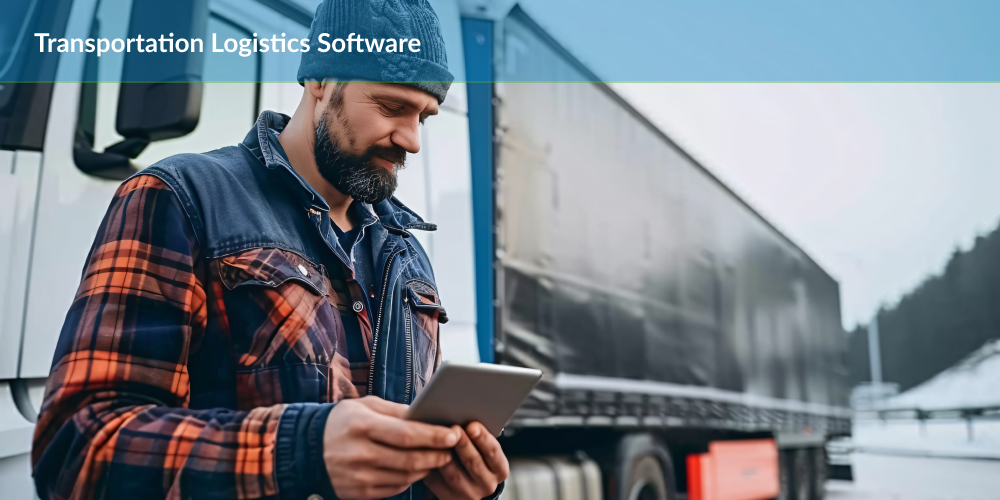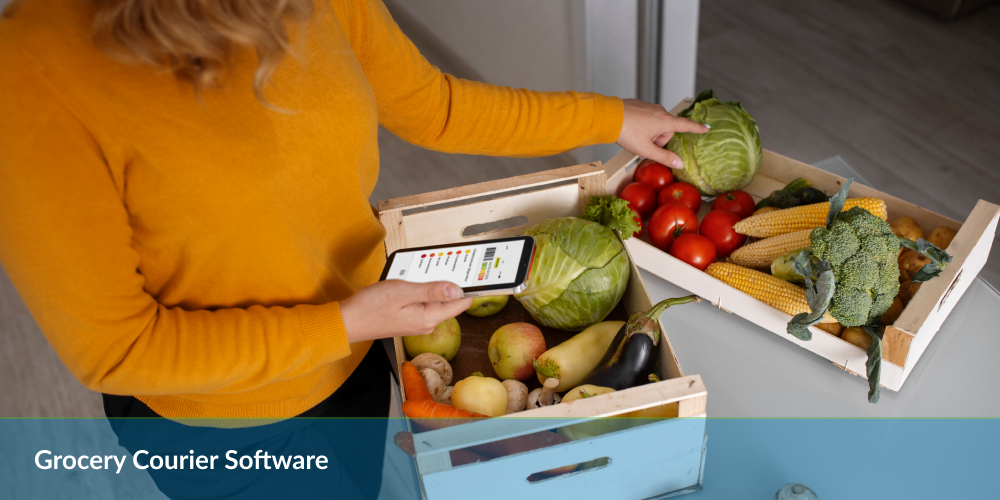Table of Contents
Have you ever wondered how transportation logistics software has transformed the landscape of supply chain management as a pivotal tool that seamlessly integrates cutting-edge technology to optimize the movement of goods from their point of origin to their final destination?
This sophisticated software orchestrates a harmonious blend of algorithms and digital resources, encompassing various functions such as advanced analytics and route optimization, thereby ensuring both adaptability and precision within the transportation sector.
Through such robust software solutions, logistics software companies experience a paradigm shift in their logistical operations, characterized by heightened efficiency, reduced costs, and elevated levels of customer satisfaction

Adopting the best logistics software for transportation is not a mere technological upgrade but a strategic move that primes businesses for success. Asset tracking, timely deliveries, predictive analytics, and comprehensive logistics management are just the tip of the iceberg regarding the extensive benefits of these applications.
As the backbone of modern transportation management, logistics software doesn’t just support the operational framework; it redefines it—delivering data-driven insights and strategic planning capabilities that propel transportation businesses into a new era of logistical excellence.
The Role of Software in Fleet Management
Fleet management is critical to the successful operation of any transportation company. Effective fleet management ensures that goods are transported efficiently and cost-effectively by overseeing every aspect of a company’s vehicle fleet, from acquisition to maintenance.
Importance of Fleet Management for Transportation Companies
Transportation logistics software is the core of modern fleet management systems, providing a robust toolkit for maximizing operational efficiency and reducing costs. Effective fleet management supports better route planning, vehicle maintenance, and driver management, which are all imperative for staying competitive in the transportation industry.
Efficient Fleet Management Enabled by Software
Transportation logistics software represents a technological leap in companies’ monitoring, controlling, and optimizing their fleet operations. With these advanced software solutions, businesses can automate tasks, streamline processes, and enhance decision-making through data-driven insights, improving fleet utilization rates and reducing downtime.
Real-time Data for Vehicle Tracking and Predictive Maintenance
Real-time data transforms fleet management, offering immediate insights into vehicle location, status, and performance. Logistics software with real-time tracking capabilities provides visibility into fleet operations and contributes to implementing predictive maintenance schedules. This proactive approach to vehicle care helps prevent breakdowns. It minimizes maintenance costs before they escalate, ensuring the longevity and reliability of the transportation fleet.
- Vehicle Tracking: Monitor each vehicle’s location and movement to optimize travel routes, improve driver accountability, and enhance customer service with accurate delivery information.
- Predictive Maintenance: Utilize data analytics and machine learning to predict potential vehicle malfunctions, scheduling maintenance only when needed rather than based on a set timeline.
Optimal Route Planning through Advanced Software
As logistics and transportation professionals know, route optimization is paramount for achieving significant cost savings and enhancing overall efficiency. An intricate part of transportation logistics software is its ability to streamline this aspect of the supply chain process, making it easier to tailor delivery routes that save time and fuel.
Utilizing cutting-edge software, companies can now access real-time data that enables dynamic routing. This means that routes can be adjusted on the fly to accommodate unexpected circumstances such as traffic delays, weather disruptions, or sudden changes in delivery schedules—all factors that traditional static routing methods cannot easily account for.
Incorporating Artificial Intelligence (AI) and Machine Learning (ML) into transportation logistics software takes route optimization to an even more advanced level. These technologies provide predictive insights for more accurate and efficient route planning.
By analyzing historical data and patterns, AI and ML can suggest alternative routes in anticipation of regular traffic snarls or recurring delays, ensuring that goods are moved via the most effective paths available.
Enhancing Supply Chain Visibility
Transparent supply chains are essential in today’s complex and dynamic market landscape. Stakeholders at every level increasingly demand the ability to access real-time information about the current status of their goods as they move through the supply chain. This transparency is not just a luxury but a necessity for maintaining competitiveness and ensuring customer satisfaction.
Transportation logistics software plays a critical role in providing end-to-end visibility. By integrating various aspects of the supply chain, these systems offer a holistic view paramount for informed decision-making. Logistics software allows companies to monitor their operations closely, anticipate potential disruptions, and adjust their strategies accordingly.
Real-time tracking is a significant feature of transportation logistics software, fundamentally strengthening supply chain resilience. It enables businesses to respond to the unexpected swiftly, minimizing delays and reducing the risk of financial losses. In addition, real-time visibility aids in building trust between customers and businesses, as it brings about a greater degree of accountability and transparency in operations.
- Transparent supply chains meet the increasing demand for real-time information and enhance customer satisfaction.
- Logistics software provides end-to-end visibility essential for strategic planning and informed decision-making.
- Real-time tracking and information systems are the backbones of resilient and responsive supply chains.
Real-time Tracking and Tracing Innovations
Transportation logistics software is rapidly transforming with the introduction of cutting-edge real-time tracking and tracing capabilities. These innovations are not only enhancing operational efficiency but also significantly improving customer satisfaction. Let’s delve into the remarkable advancements that are reshaping the transportation industry.
The Demand for Up-to-the-Minute Tracking for Customer Satisfaction
In the fast-paced world, customers expect real-time updates and total visibility of their shipments. Transportation logistics software has risen to the challenge, providing precise tracking information that elevates customer experience and sets businesses apart. This level of service is becoming a key differentiator in a crowded marketplace.
How Tracking Can Influence Carrier Selection and Improve Customer Service
Advanced tracking features within transportation logistics software can be the tipping point when choosing a carrier. These systems enable businesses to monitor carrier performance and make informed decisions based on delivery accuracy and punctuality, leading to superior customer service and strengthened partnerships.
Explore IoT and Telematics Integration for Advanced Tracking Capabilities
The intersection of the Internet of Things (IoT) and telematics has brought groundbreaking functionalities to freight logistics software. By utilizing sensors, GPS, and real-time data communication, logistics providers now have unprecedented visibility into every stage of the supply chain. These technological leaps ensure companies remain agile and responsive in a continuously evolving market.
- GPS Tracking: Instantaneous location data enables businesses to optimize delivery routes and anticipate potential delays.
- Sensor Technology: Monitor the condition of sensitive cargo, ensuring quality control and reducing spoilage or damage.
- Telematics Data: Gain insights into vehicle performance and driver behavior, leading to improved safety and efficiency.
Smart Load Planning and Freight Consolidation
In the competitive world of transportation logistics, harnessing the power of smart load planning and freight consolidation is essential for achieving efficiency and reducing costs. Advanced transportation logistics software has revolutionized how businesses approach these critical aspects, delivering a strategic advantage that cannot be overlooked.
The Strategic Advantage of Automated Load Planning
With the integration of automated systems, logistics companies can now plan their loads with unprecedented precision. Transportation logistics software utilizes sophisticated algorithms to ensure that cargo space is maximized and resources are not wasted. This increases overall efficiency and drives down overhead expenses associated with underutilized space.
Software Solutions for Optimized Freight Consolidation
Effective freight consolidation is another key feature of advanced software solutions that streamline shipping. By combining smaller loads into one larger shipment, businesses can optimize transportation efforts, leading to fewer trips and significant cost savings. These logistic management software are tailored to analyze and recommend the best consolidation options, considering delivery timeframes, destination routes, and load compatibility.
Relationship Between Load Planning and Reduced Transportation Costs
There’s a direct correlation between meticulous load planning and the reduction of transportation costs. By leveraging the capabilities of modern transportation logistics software, companies can expect a reduction in fuel consumption, labor costs, and overall operational expenditures. The software provides real-time data and predictive analytics, enabling logistics managers to make informed decisions that resonate with the bottom line—transforming load planning from a challenge into an opportunity for savings and improved efficiency.
- Maximized cargo space and minimized wasted resources
- Strategic consolidation leads to fewer trips and cost savings
- Load compatibility and optimization for best delivery outcomes
Streamline Your Logistics with Advanced Carrier Selection and Rate Comparison
Choosing the right carrier for transportation needs is pivotal for the success of any logistics operation. Transportation logistics software enhances this decision-making process by offering comprehensive carrier selection and rate comparison capabilities. These features are the cornerstone for companies aiming to manage operational costs effectively and maintain competitive service levels.
The Necessity for Competitive Carrier Selection in Logistics Software
Carrier selection is not just about finding a means to transport goods; it’s about identifying the most reliable and cost-effective shipping partners. Top-tier transportation logistics software comes equipped with sophisticated algorithms that analyze multiple carriers, evaluating them based on performance history, pricing, and service offerings. This enables logistics managers to make informed decisions that align with their strategic goals and customer commitments.
How Real-Time Data Aids in Quick Rate Comparison
The transportation sector operates at a relentlessly quick pace. Access to real-time data is essential for logistics coordinators to stay ahead. With up-to-the-minute rate information fed directly into the logistics software, users can quickly compare various carriers, spot the most economical options, and lock in the best rates without delay. This agility ensures transportation plans can adapt to market fluctuations and unexpected changes in supply chain dynamics.
The Benefit of this Feature to Transportation Companies in Managing Costs
For transportation companies, the bottom line is always a priority. An advanced transportation logistics software with carrier selection and rate comparison features empowers businesses to manage costs proactively. Users can spot trends, forecast expenses, and decide with a full understanding of the financial implications. In the competitive world of logistics, the ability to minimize shipping costs while maintaining service quality can mark the difference between profit and loss.
- Cost Efficiency: By comparing different carrier rates side by side, companies can significantly reduce shipping expenses.
- Service Optimization: Evaluating carriers based on performance ensures that the business and its customers’ needs are consistently met.
- Increased Negotiating Power: With extensive data, businesses can negotiate better rates and service terms with carriers.
Optimizing Last-Mile Delivery with Advanced Logistics Software
Last-mile delivery is the final step of the transportation process, where goods are delivered to the end customer. This phase is crucial for transportation companies as it significantly influences customer satisfaction and loyalty. However, it presents unique challenges like route efficiency, delivery speed, and cost management.
Streamlining Last-Mile Challenges with Technology
Last-mile delivery with advanced logistics software optimizes its function through several key factors:
Route Optimization: Advanced logistics software uses algorithms to determine the most efficient delivery routes, considering traffic patterns, delivery locations, and delivery time windows. This minimizes travel time and reduces fuel consumption.
Real-Time Tracking: Logistics software enables accurate shipment status monitoring by providing real-time tracking of delivery vehicles. This allows for better coordination between drivers and dispatchers, leading to timely deliveries and improved customer satisfaction.
Dynamic Scheduling: Advanced software dynamically adjusts delivery schedules based on changing weather conditions, traffic congestion, or unexpected delays. This flexibility ensures that deliveries are completed on time despite unforeseen challenges.
Data Analytics: Logistics software analyzes historical delivery data and performance metrics to identify optimization and efficiency improvement opportunities. This may involve identifying trends, optimizing inventory management, or fine-tuning delivery routes based on past performance.
Integration with IoT and Automation: Integration with Internet of Things (IoT) devices and automation technologies allows for seamless communication between delivery vehicles, warehouses, and distribution centers. This streamlines the entire delivery process, reduces manual intervention, and enhances efficiency.
The strategic integration of last-mile delivery logistics software streamlines operations. It significantly improves the customer experience, which is essential in today’s competitive marketplace.
Navigating Compliance and Regulatory Challenges with Software
The logistics industry constantly adjusts to the evolving compliance and regulatory requirements landscape. With rules and standards changing frequently, transportation companies must stay ahead of the curve. Failure to do so can result in severe penalties, operational disruptions, and damage to reputation.
How Software Assists with Regulatory Practices
Transportation logistics software is an indispensable tool for businesses aiming to keep their operations aligned with current laws and regulations. Here’s how:
- Automated Updates: Software providers often incorporate the latest regulatory changes into their systems, ensuring users are always compliant.
- Easier Record-Keeping: These systems manage and store necessary documentation, such as shipping records and environmental reports, making it easier for businesses to provide evidence of compliance.
- Training Modules: Some software solutions include training components to inform employees about new regulations and standards.
The Impact of Sustainability in Logistics
Sustainability is becoming a driving force in logistics practices, impacting corporate responsibility and compliance. Transportation logistics software enables businesses to:
- Monitor carbon emissions and other environmental metrics for reporting purposes.
- Implement more efficient routing to reduce fuel consumption and emissions.
- Choose carriers that align with their sustainability goals based on transparent data.
Leveraging advanced transportation logistics software is crucial for navigating complex compliance and regulatory challenges. It enables companies to focus on growth and service excellence while adhering to critical standards.
Data Analytics: Transforming Transportation with Insights
Transportation logistics software has evolved into an indispensable tool for companies seeking to optimize their operational efficiency. The role of data analytics within this domain cannot be overstated; it functions as the linchpin that transforms vast amounts of data into coherent, actionable insights that drive informed decision-making and foster a competitive edge.
Elaborate on how data analytics in transportation logistics software can optimize operations.
Data analytics leverages the power of transportation logistics software to scrutinize and interpret complex datasets. Businesses can anticipate demand, manage inventories more effectively by analyzing patterns and trends, and enhance their overall logistics performance. Optimized operations lead to reduced costs, improved delivery times, and elevated customer satisfaction.
Role of predictive analytics in decision-making processes
Predictive analytics is a key component in the modern transportation logistics arsenal. This forward-looking approach allows companies to forecast future scenarios using historical data. Thus, logistics managers are empowered to make proactive decisions, such as adjusting fleet capacities or rerouting shipments to avoid potential delays, ultimately leading to a more resilient supply chain.
How logistics software aids in transforming data into actionable business insights
The prowess of logistics software lies in its ability to convert raw data into insights that can be easily interpreted and acted upon. Advanced algorithms and machine learning models dissect performance indicators, highlighting areas for improvement, identifying savings opportunities, and suggesting measures to enhance quality assurance. This intelligence is reactive and equips businesses with the foresight to stay ahead of market shifts and customer demands.
- Optimization of resources and cost savings
- Enhanced predictive capabilities for demand forecasting
- Streamlined supply chain operations with real-time data
- Empowerment of strategic decision-making
- Discovery of new opportunities for growth and efficiency gains
Optimize Logistics with Advanced 3PL Software Solutions.
Third-party logistics Software Solutions are transforming the transportation industry. With the growing trend of 3PLs, businesses are increasingly seeking ways to leverage these services for enhanced efficiency and strategic advantage.
Streamlining Operations and Communication
The right 3PL software is crucial for companies that want to streamline communication and operations. This specialized software facilitates seamless interactions between shippers, carriers, and customers, ensuring all stakeholders are on the same page. By integrating various logistics functions, 3PL software reduces errors, speeds up processes, and enables real-time decision-making.
Integrating E-Commerce with 3PL
E-commerce has witnessed explosive growth, and with it comes the need for scalable logistics solutions. Integrating e-commerce platforms with 3PL providers is a testament to this pressing requirement. This integration ensures that online orders are automatically synced with the 3PL’s system, aiding in efficient inventory management, order fulfillment, and returns processing. Thus, it provides an end-to-end solution for both e-commerce retailers and their customers.
By embracing sophisticated third-party logistics software, companies can enhance their day-to-day operations and position themselves strategically for the dynamic future of worldwide commerce and customer satisfaction.
Outlook on AI and ML in Transportation Logistics Software
The landscape of transportation logistics is undergoing a monumental shift with the integration of artificial intelligence (AI) and machine learning (ML). As these technologies evolve, they will revolutionize how logistics companies manage their operations and remain competitive in an ever-changing market.
The Transformative Effects of AI and ML
AI and ML are not just buzzwords in the realm of digital transformation. They are powerful tools that drive efficiency, reduce costs, and predict market trends. By harnessing these technologies, transportation logistics software can learn from data, anticipate problems, and suggest actionable solutions in real time. This level of intelligence in software is pivotal in enhancing decision-making processes, optimizing resource allocation, and ultimately providing a higher level of service to customers.
Shaping the Future of Transportation Logistics
AI and ML are poised to reshape the future of transportation logistics by automating complex tasks, improving accuracy, and facilitating proactive and predictive measures. These technologies are fundamental in creating agile logistic operations that can respond to current demands and forecast and adapt to future challenges.
- Automated Data-Driven Decision Making: By analyzing vast amounts of data, AI-driven logistics software can make informed decisions, minimizing the risk of human error.
- Enhanced Route Optimization: ML algorithms can process real-time traffic data to optimize delivery routes, thus saving time and fuel.
- Intelligent Forecasting: AI tools can predict fluctuations in demand and adjust supply strategies accordingly, ensuring efficient inventory management.
Real-life Examples of AI-Fueled Logistics Innovations
The potential of AI and ML is not just theoretical; it’s being realized by companies spearheading logistics innovation. Here are a few examples where AI is making a tangible impact:
Autonomous Vehicles: AI-enabled self-driving trucks are beginning to hit the roads, reducing labor costs and increasing safety.
Smart Warehouses: AI-powered robots optimize pick-and-pack processes, enhancing speed and reliability in warehouse operations.
Advanced Forecasting Tools: Transportation firms use ML to forecast demand better, manage inventory levels, and improve customer satisfaction.
It’s clear that AI and ML are not just futuristic concepts but are active drivers of innovation in transportation logistics software today. They represent a frontier of opportunities with the power to redefine industry standards and how we think about logistics and supply chain management.
Key Takeaways
- Transportation logistics software integrates cutting-edge technology to optimize goods movement, enhancing efficiency and customer satisfaction.
- Transportation logistics software is pivotal in effective fleet management, maximizing efficiency, and reducing costs through route planning and real-time data insights.
- Advanced software enables dynamic route adjustments, reducing fuel consumption, delivery times, and carbon emissions while improving service levels.
- Up-to-the-minute tracking influences carrier selection and fostering trust through transparency and communication.
- Advanced software streamlines last-mile challenges, optimizing routes, providing real-time tracking, and enhancing the overall customer experience.
- Transportation logistics software aids in navigating regulatory challenges while also promoting sustainability through emissions monitoring and efficient routing.
- The integration of artificial intelligence and machine learning shapes the future of transportation logistics, enabling automated decision-making, enhanced route optimization, and predictive analytics.
Conclusion
Transportation logistics software has become the driving force behind innovative and efficient transportation businesses. As discussed, these sophisticated systems are crucial in fleet management, route planning, supply chain visibility, etc.
Adopting state-of-the-art logistics software solutions is no longer an option for companies aspiring to lead the market; it’s necessary for sustained competitiveness and growth. The transportation landscape is evolving rapidly, and businesses must stay agile, anticipating and harnessing the power of emerging software trends to maintain an edge.
Organizations that invest in these technologies can expect significant returns, with improved operational efficiency, reduced costs, and enhanced customer satisfaction. And, as we barrel towards a future where AI and machine learning are poised to transform logistics even further, now is the time for transportation firms to act.
Forge the future of your transportation operations, embrace the robust transportation logistics software revolution with NetworkON, and watch your business achieve unprecedented efficiency and customer satisfaction.
Contact us today for more information, to view case studies, or to schedule a demo.
Frequently Asked Questions
What are the key features to look for in transportation logistics software?
Effective transportation logistics software should offer real-time tracking, route optimization, predictive analytics, and integration with IoT devices. These capabilities enhance fleet management, streamline operations, and improve overall efficiency in transportation logistics.
How does transportation logistics software benefit fleet management?
Transportation logistics software optimizes fleet management by providing tools for route planning, vehicle maintenance scheduling, and real-time vehicle tracking. This leads to improved operational efficiency, reduced downtime, and better resource utilization, resulting in cost savings and enhanced customer satisfaction.
How does transportation logistics software address last-mile delivery challenges?
Advanced third-party logistics software optimizes last-mile delivery by utilizing route optimization algorithms, real-time tracking, dynamic scheduling, and data analytics. These features enable companies to minimize delivery times, reduce fuel consumption, and enhance customer experience through accurate ETAs and status updates.
What role do artificial intelligence (AI) and machine learning (ML) play in transportation logistics software?
AI and ML technologies in transportation logistics software enable automated decision-making, enhanced route optimization, and predictive analytics. These capabilities help businesses forecast demand, optimize resource allocation, and automate complex tasks, leading to improved efficiency, cost savings, and competitive advantage in the market.





0 Conversations